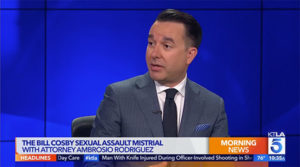Assault Attorney in Los Angeles, CA
Have you been charged with assault in Los Angeles, CA? Assault and battery charges can be life-changing and even occur without actual injury or harm. They are also wobbler offenses that may be upgraded to felonies based on the circumstances.
For over 20 years, The Rodriguez Law Group Los Angeles Criminal Defense Attorneys has represented clients facing serious violent criminal charges. We will put our experience and reputation to work for you. Call our law firm at for a free case review with a Los Angeles assault attorney who can help you.
How The Rodriguez Law Group Los Angeles Criminal Defense Attorneys Can Help if You’re Arrested for Assault in Los Angeles

It can be shockingly easy to face assault or battery charges — even when no one was hurt. An argument that goes too far or a simple fight with one or two punches can trigger a violent criminal charge in Los Angeles. When you are facing assault and battery charges, you deserve a Los Angeles criminal defense attorney to give you the legal representation you deserve.
At The Rodriguez Law Group Los Angeles Criminal Defense Attorneys, we understand how overwhelming an assault charge can be, especially if you have no criminal record. Founding attorney Ambrosio E. Rodriguez will help you fight for your freedom.
If you need an assault and battery lawyer, Attorney Rodriguez has decades of experience in criminal law, including 13 years of experience as a Senior Deputy District Attorney. He will use this insight into the state’s tactics to build the strongest defense possible.
Choose The Rodriguez Law Group Los Angeles Criminal Defense Attorneys to represent you in your Los Angeles assault case, and count on us to:
- Offer the sound legal advice and support you need to make decisions about your case
- Protect your constitutional rights
- Investigate the circumstances of your case to identify motives for false accusations and gather exculpatory evidence
- Fight for reduced charges or dismissal if the circumstances in your case do not fit the charge
- Argue for reduced penalties, alternative sentencing options, and the best possible outcome of your case
- Exploit weaknesses in the prosecution’s case and argue they have not met the burden of proof to convict
Call our Los Angeles, California law office today to schedule a free consultation with a Los Angeles assault defense lawyer near you ready to help.
What is Assault in California?

What is Assault in California, and Is It The Same as a Civil Assault Lawsuit?
Under the California Penal Code, assault is considered a violent crime. Like many states, California separates assault into two types of offenses: assault or battery. However, the two separate charges of assault and battery are often combined together in many states.
You may be charged with assault if you unlawfully attempt to injure someone else, even if you do not follow through or succeed. Battery, on the other hand, is charged when you commit force or violence against someone else.
These charges are usually complicated, so we recommend calling our experienced Los Angeles assault and battery lawyers near you.
Climate Facing Los Angeles Assault or Battery Case
A Los Angeles assault is a serious matter. Any crime featuring harmful or offensive contact, especially if it causes physical injuries, such as sexual assault, where the defendant acted unlawfully, they face a variety of punishments.
Assault
An assault charge may be brought under California Penal Code Section 240 PC. This statute defines assault as an “unlawful attempt, coupled with a present ability, to commit a violent injury on the person of another.”
Assault may be charged if, for example, someone throws a bottle or rocks at someone else but misses or attempts to strike someone but fails.
Battery
Battery is charged under California Penal Code Section 242 PC. This statute defines battery as a “willful and unlawful use of force or violence upon the person of another.”
You can be charged with battery even if the other party does not suffer pain or injury if you offensively touch them. Shoving or spitting on someone can be charged as a battery.
Battery is usually a misdemeanor, but it may be charged as a serious misdemeanor or offense if it results in serious injury. our top-rated Los Angeles assault and battery attorneys near you.
Battery Causing Serious Bodily Injury
Battery causing serious bodily injury under Penal Code 243(d) PC defines aggravated battery, also known as aggravated assault in other states. This charge may be a misdemeanor or felony, depending on the circumstances and severity of injury.
Serious injuries cause severe impairments of someone’s physical condition or abilities. This charge does not require the victim to seek medical attention, nor does it require that the injury be long-lasting or permanent.
Loss of consciousness, fractures, concussions, extensive sutures, and disfigurement can all be considered serious injuries. However, it will be up to a jury to decide in each case whether an injury should be regarded as serious and justify this charge.
Domestic Battery

Penal Code Section 243(e) defines domestic battery. This is one of the most common criminal charges related to domestic violence. Domestic battery is the same offense as battery, which is willfully touching a victim in an offensive or harmful way. However, it is charged if the victim is the defendant’s former or current spouse, current or former dating partner, household member, or co-parent.
Corporal Injury to Spouse/Cohabitant
Under Penal Code 273.5(a) PC, this offense is charged for willfully inflicting traumatic injury on a spouse, intimate partner, former or current cohabitant, or co-parent. This domestic violence offense is charged instead of domestic battery when the victim suffers more serious injuries. However, the difference between the two statutes can be subtle.
“Corporal injury” can refer to minor or serious injuries that cause a traumatic condition. They can be as minor as sprains or bruises.
This offense can be a misdemeanor or felony charge, depending on the circumstances, prior criminal history, and severity of injuries. Contact our Los Angeles assault and battery lawyers today.
Assault with a Deadly Weapon
Assault involving a firearm is charged under California Penal Code 245 PC. This is one of the most serious violent crimes in California and is charged for attacking or attempting to attack or harm someone with a deadly weapon or means likely to cause significant bodily injury.
ADW or aggravated assault is a misdemeanor or felony, depending on the circumstances.
What Are the Penalties for Assault in Los Angeles, California?

The penalties for assault and battery can be serious, even when charged as a misdemeanor. These offenses are considered violent crimes under California law.
Simple assault or battery are misdemeanor offenses punishable by up to 6 months in county jail. However, the penalties can be increased if there are aggravating factors.
A misdemeanor battery causing serious bodily injury is punishable by up to one year in jail. If charged as a felony, you may face two to four years in jail.
Battery that results in “great bodily injury” can come with an enhanced sentence as a felony. If a jury finds the victim suffered a great injury, you can be punished with an additional 3 to 6 years in prison in addition to the sentence under Penal Code 243(d).
If you are charged with corporal injury to a spouse, you may be facing up to one year in jail for a misdemeanor and up to 4 years in prison for a felony. With prior convictions, you may face an enhanced sentence.
For assault with a deadly weapon (ADW), you may face up to one year in jail for a misdemeanor charge or up to 4 years for a felony ADW. However, this offense is only a wobbler when a firearm was not used. If the offense was committed with a firearm, you face a minimum jail term of 6 months for a misdemeanor. It may be an automatic felony with the use of certain firearms. If convicted of felony ADW involving a firearm, you face up to 12 years in prison.
Depending on the circumstances, you may face additional penalties for assault and battery. This may include domestic violence classes, a protective order, hefty fines, and community service. Some assault and battery offenses also count as a strike under California’s Three Strikes Law. If convicted of a strike offense, you may face a doubled prison sentence and other enhanced penalties.
Assault and battery offenses in California can be complex, with many possible statutes and penalties that depend greatly on the circumstances. Most offenses are wobblers which means your criminal record, the circumstances of your case, and the level of injury are all considered. This makes it crucial to work with an experienced Los Angeles assault and battery lawyer to fight back against possible felony charges.
What Defenses Are Available if I’m Accused of Assault in Los Angeles, CA?
An assault and battery case has many possible legal defenses depending on the circumstances.
A Los Angeles criminal defense lawyer at The Rodriguez Law Group Los Angeles Criminal Defense Attorneys will help you explore the best legal strategies, which may include:
- You did not have the ability to inflict violence or force on the other party in the case of assault.
- You were acting in self-defense or defending another person.
- You did not act will willful intent as required by law.
- You have been falsely accused or the victim or mistaken identity.
- The injury was not “serious.” This defense may be used if you are charged with battery with great bodily injury. California does not clearly define serious bodily injury and leaves it up to a jury to decide. An investigation may reveal that the victim’s injuries have been exaggerated.
In addition to these strong legal defenses, The Rodriguez Law Group Los Angeles Criminal Defense Attorneys will investigate whether your constitutional rights were violated. If so, we will seek to have evidence obtained excluded so it cannot be used against you. Contact our experienced LA assault and battery attorneys near you.
Contact a Los Angeles Assault Attorney for a Free Consultation
When you are charged with assault and battery in Los Angeles, you are facing a violent criminal charge with harsh penalties and possible sentence enhancements. You deserve an experienced Los Angeles criminal defense attorney who will aggressively fight the charges you are facing. Call The Rodriguez Law Group Los Angeles Criminal Defense Attorneys today for a free consultation with a Los Angeles assault and battery attorney ready to help.

Los Angeles Assault Attorney, Ambrosio E. Rodriguez
The Rodriguez Law Group Los Angeles Criminal Defense Attorneys – Los Angeles Office
626 Wilshire Blvd Suite 460
Los Angeles, CA 90017
P: (213) 463-1993
Los Angeles Assault Lawyer Review
⭐⭐⭐⭐⭐ I want to Thank My Wonderful Attorney Mr. Rodrigues For helping my family and I . He is a kind and understanding person and he tells you straight from the heart, what could happen and what could not happen, and what he could do for you, he was straight with this from the beginning. And I appreciate that, I kept calling a lot and he was very understanding and always put me at ease. That meant alot to me !. I would recommend him with all my heart, because I feel he is out there for “you” and doing his very best at what he does to try and help you. I want to thank Mr. Rodriguez with all My Heart for everything you did for us. Thank you so much ❤ Sincerely Grace G.
– Dee G.
https://goo.gl/maps/1eFP3MrQTuVgdFUX8
Read more of our reviews here.


